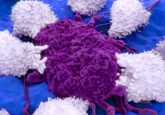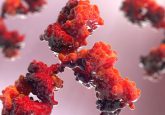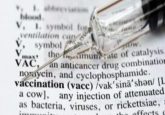European Cancer Patient Coalition’s 2017 pipeline – interview with Lydia Makaroff

Lydia Makaroff of the European Cancer Patient Coalition (ECPC, Brussels, Belgium) speaks with Oncology Central about the goals and upcoming projects for the ECPC including raising awareness of head and neck cancers and promoting the CanCon recommendations on how to boost equitable access to innovative medicines such as immuno-oncology.
First, could you tell us a little about your background and your current role at the European Cancer Patient Coalition (ECPC)?
I am the Director of the ECPC, with 10 years’ international experience in non-communicable disease research and policy development in academia, the pharmaceutical industry and the non-profit sector. My research interests include the global impact of non-communicable diseases as well as on access, prevalence, cost and complications. Currently, I serve as a Board member of Pancreatic Cancer Europe, and I am also a member of the ECPC Working Group on Bladder Cancer and the ECPC Working Group on Rare Cancers.
Could you tell us about the goals of the ECPC?
The ECPC works for a Europe of equality, where all European cancer patients have timely and affordable access to the best treatment and care available, throughout their life. The ECPC believes that cancer patients are the most important partners in the fight against cancer and against all the cancer-related issues affecting our society. Policy makers, researchers, doctors and industry should recognize cancer patients as co-creators of their own health.
Our Mission:
- Empower European cancer patients through the dissemination of fundamental information regarding cancer;
- Foster co-operation among cancer patients’ organizations through joint activities;
- Ensure that state-of-the-art cancer care practices are shared across the European Union (EU);
- Make cancer a priority for action on the European health policy agenda;
- Have an active role in shaping European and national healthcare policies that impact on cancer patients;
- Contribute to change or create EU and national laws to satisfy cancer patients’ needs;
- Call for research on survivorship issues and advocate for better healthcare and social services for them.
What strategies will the ECPC utilize to achieve these goals?
The Board of the ECPC has identified four main pillars of the strategy of the ECPC: governance, policy, capacity-building, and research. Over the next 3 years we will work to build a sustainable governance model, influence the European and national legal framework and political agenda, empower cancer patient organizations to enhance their ability to shape national policy and increase the role of patients in cancer research.
We will also continue to strengthen our collaborations with the European Parliament, European Commission and European Medicines Agency to ensure that the European Institutions recognize patients as valuable and unique sources of insights and information.
What are your main priorities for the ECPC in 2017?
The motto of the ECPC is “nothing about us, without us!”. Our main priorities for 2017 are to: build the capacity of our members, advocate for better health policies and actively participate in European research projects to ensure the patient voice is heard.
An upcoming ECPC project focuses on promoting the CanCon recommendations on how to boost equitable access to innovative medicines, including immuno-oncology. Could you tell us more about the plans for this project and success the ECPC has had so far?
On the 14th and 15th of February, the new European Guide on Quality Improvement in Comprehensive Cancer Control was officially presented during the final conference of the Joint Action on Cancer Control (CanCon) (14–15 February, Malta). Joint Action on Cancer Control (CanCon) is a common effort between representatives from 17 EU Member States, co-funded by the European Commission (Directorate-General for Health and Food Safety). Cancon aimed to contribute in different ways to reducing the cancer burden in the EU by creating a European Guide on Quality Improvement in Comprehensive Cancer Control. The ECPC was a key partner of CanCon, and contributed to the drafting of the guide and of the policy papers.
CanCon made history by including the patients’ perspective in the very core of its methodology, work model and final outcomes. The ECPC has been involved in the Joint Action since the beginning, providing insight and steering the debate related to several chapters of the Guide. This factor enriches the value of the Joint Action’s outcome: CanCon demonstrated that the European Union can go beyond papers produced “by experts for experts” and that it can embrace a more political and efficient way to promote cohesion and collaboration, based on evidence and co-created by European citizens affected by cancer. CanCon is a milestone for all European cancer patients because of the arguments that the ECPC brought forward. Many of the recommendations in the final guide and policy papers come directly from the individuals fighting against cancer every day and we can proudly say that its achievements are also the achievements of the European cancer patient community.
As part of a year-long dissemination campaign, we will be presenting the European Guide on Quality Improvement in Comprehensive Cancer Control to the European Parliament on 25 April 2017 and to our Members during the ECPC meeting (16–18 June, in Brussels, Belgium) on 17 June 2017 .
One of the ECPC’s projects for this year is to raise awareness of head and neck cancers – as part of the Make Sense Campaign. Could you tell us more about this project?
Head and neck cancers are the 6th most common types of cancer in Europe with more than 150,000 new patients diagnosed every year. There is little awareness of head and neck cancers among the public with many cases diagnosed at late stage. Despite major advances in the treatment of head and neck cancer, over the past three decades, with new surgical tools and radio therapeutic modalities, the overall patient outcomes remain disappointingly unchanged.
The ECPC is a partner in the Make Sense campaign, working with the European Head and Neck Society to advocate for better awareness of head and neck cancers. The ECPC and the European Head and Neck Society have published a White Paper on Head and Neck cancer [1] advocating for increased awareness, better prevention & treatment, standardized care and better quality of care and quality of life after diagnosis.
As part of the September 2017 Make Sense campaign, the ECPC will work with our Members to disseminate an online communication and advocacy campaign. We will also organize an event in the European Parliament to promote better quality of life for cancer patients and survivors, as well as awareness of these cancers and call for prevention, earlier diagnosis and timely treatment.
Could you tell us about the ECPC Immuno-oncology portal?
The Immuno-Oncology Portal (IOP) is Europe’s first information hub on cancer immunotherapies produced by patients for patients. The Immuno-Oncology Portal responds to the need of cancer patients to understand more about cancer immunotherapies. There is one interactive module on cancer immunotherapies and one module on immuno-oncology treatments. Since its launch in November 2015, the Immuno-Oncology Portal has collected thousands of visits, resulting in many individuals with cancer gaining a better understanding of immuno-oncology treatments. The Immuno-Oncology Portal is now available in English, Greek and Polish. Soon the immuno-oncology portal will also be available in Spanish, Dutch and French.
Do you have any closing comments or messages for our readers?
Hellen Keller once stated: “walking with a friend in the dark is better than walking alone in the light.” I am so proud to be part of this amazing cancer community and how so many individuals with cancer are working so hard for better outcomes and increased support for all. I encourage all cancer patient organisations throughout Europe to join us at our Annual Meeting on (16-18 June, Brussels, Belgium).
Reference
[1] Lefebvre JL, Licitra L, Leemans R, Tassini U & van Dijk B, Head and neck cancer:
The ‘curable’ cancer that kills over half of all sufferers – it is time to do something about it. Brussels, Belgium: European Cancer Patient Coalition and the European Head and Neck Society (2013).
Financial disclosure statement:
Lydia Makaroff is an employee of the European Cancer Patient Coalition, which has received funding from AbbVie, Amgen, AstraZeneca, Baxter, BMS, Boehringer, Celgene, Helsinn, Genomic Health, Ipsen, Johnson & Johnson, Eli Lilly & Company, Merck, MSD, Novartis, Pfizer, and Roche.
Profile:
 Lydia Makaroff joined the ECPC in September 2016 as Director. She has ten years’ international experience in non-communicable disease research and policy development in academia, the pharmaceutical industry, and the non-profit sector. She conducted scientific research during her PhD at the Australian National University and as a senior post-doctoral fellow at the University of Washington Medical Center with support from the Australian Cancer Research Foundation and the Cancer Council. After working in Global Market Access at a pharmaceutical company, she joined the International Diabetes Federation as their Epidemiology and Public Health Manager. Her team quantified the global impact of diabetes and published research on prevalence, cost, and complications. She monitored national governments’ commitments to non-communicable diseases, provided advocacy tools to national associations, and wrote policy papers on strategies to improve access to medicines and reduce health inequalities. Lydia holds a PhD in immunology from the Australian National University and a Masters’ degree in Public Health from the University of Queensland. She is an Australian-Belgian dual national who speaks English and has a good knowledge of French.
Lydia Makaroff joined the ECPC in September 2016 as Director. She has ten years’ international experience in non-communicable disease research and policy development in academia, the pharmaceutical industry, and the non-profit sector. She conducted scientific research during her PhD at the Australian National University and as a senior post-doctoral fellow at the University of Washington Medical Center with support from the Australian Cancer Research Foundation and the Cancer Council. After working in Global Market Access at a pharmaceutical company, she joined the International Diabetes Federation as their Epidemiology and Public Health Manager. Her team quantified the global impact of diabetes and published research on prevalence, cost, and complications. She monitored national governments’ commitments to non-communicable diseases, provided advocacy tools to national associations, and wrote policy papers on strategies to improve access to medicines and reduce health inequalities. Lydia holds a PhD in immunology from the Australian National University and a Masters’ degree in Public Health from the University of Queensland. She is an Australian-Belgian dual national who speaks English and has a good knowledge of French.





